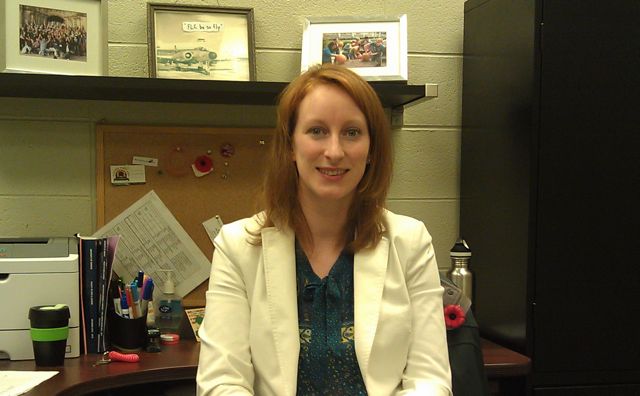Heidi Pepper Coles, First Year Learning Communities
Heidi Pepper Coles, Program Coordinator, First Year Learning Communities
The history of the First Year Learning Communities (FLC) program goes back to 2005, when it was piloted as a program for commuter students in the Life Sciences, to fill a gap in helping students engage with campus. Faculty and registrars saw a cohort of Life Science students who came to campus to take the same set of courses, and then went straight home when classes were over. The idea was to create a kind of “homeroom” experience where students can be part of a community, make friends in their cohort, and receive guidance during their transition from high school. After the initial pilot, the program exploded in popularity, and after a few periods of expansion, there are now 31 FLC (pronounced “flick”) groups within 7 departments in the Faculty of Arts and Science, each with about 20 to 30 Canadian or international students.
Coles sees the major benefit to FLC for students is by creating a “front line” of people to talk to right away when questions come up. Students get preventative information to make good decisions, and they can air grievances safely. She says FLCs provide many supports to students because they take shape according to the nature of the group’s interests. For example, if everyone is stressed after midterms, they might change plans and have a social day to relax.
A core part of the program’s success is that each FLC is led by a Peer Mentor and Assistant Peer Mentor, both upper-year students who have had experience finding a balance between academics and extra-curriculars on campus. Peer Mentors decide the program each week for their group based on their students’ interests, and typically choose a mixture of academic support (like sessions on time management and study skills), and social activities (like ice skating at Nathan Philips Square). As well, each FLC is guided by a faculty advisor, who attends about half of the group meetings, consults with the Peer Mentors about their planning, and sometimes co-presents with the Peer Mentors (on topics like choosing a Major). Coles says faculty advisors enjoy the opportunity to get to know their students outside of class, as a contribution to service.
What challenges do you feel are most pressing for current UofT students?
“Connections and finding community. UofT life is so decentralized so there’s no one place to go. Students get inundated with a lot of information. It’s hard to know where to go for help, and their friends are all in different places. A lot of students come in not fully understanding the UofT structure. When we talk about it I always say your College is where you live, and your department is where you work.”
What response do you receive from students?
“Our survey responses are excellent. Students in FLCs report higher levels of support, inclination to get involved, an easier transition, easier times finding help, and greater connections to campus.”
What is something that you think most faculty would be surprised to know about their students?
“Just how many other things students have on the go. They can be commuting hours to campus, working, involved with their church, and still managing to balance it all. There are times when I will be on Skype with my Peer Mentors at 11pm because that’s the time when they’re available. And then they’ll go back to studying! But I also think faculty might be surprised by how much students actually want to be engaging with them. They just don’t know how some times.”
What can faculty do in their courses to help students the most?
“I think faculty really have the opportunity to put students in touch with services and information. Like explaining how to book appointments with the writing centre while the essay assignments are handed out, or give a schedule of extra tutorials around exam time.”
